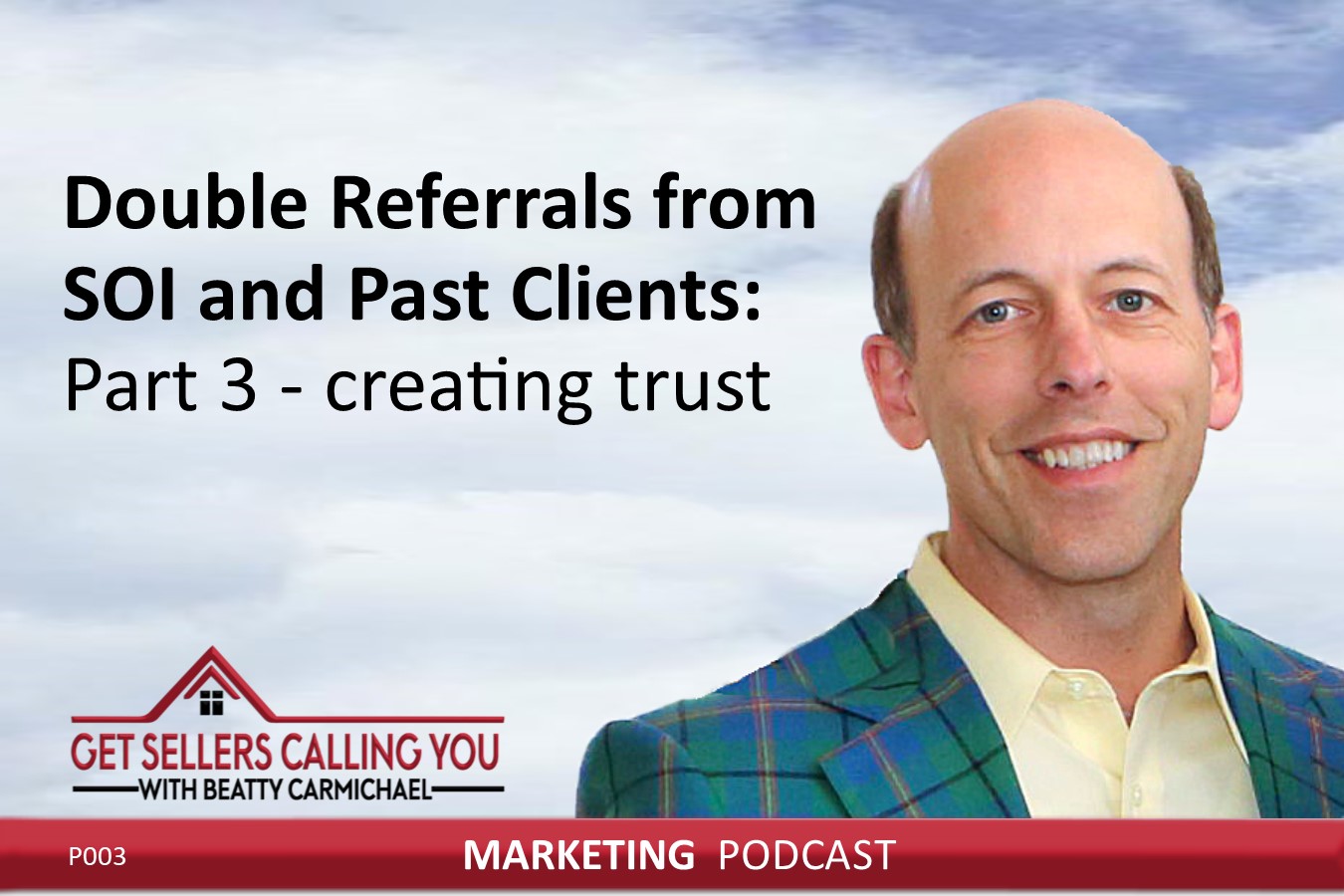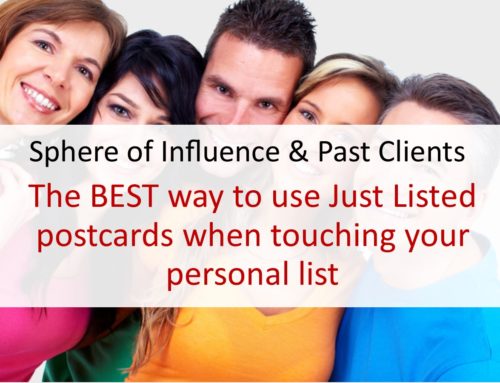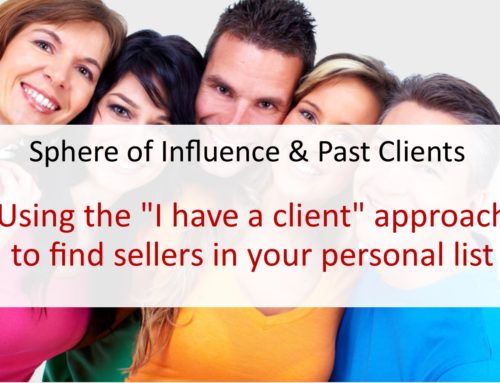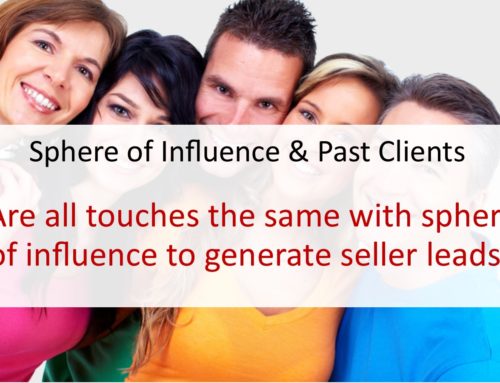Have Questions or Comments? Please ask your questions in the comments section below. We attempt to respond to ALL questions or comments.
Listen via YouTube video if desired
Transcript:
Beatty: This is the Get Sellers Calling You marketing podcast for real estate agents, and I am Beatty Carmichael. For simple to do, proven marketing strategies focused exclusively on finding sellers and getting more listings, visit our website at getsellerscallingyou.com. Now, let’s begin our next session of Get Sellers Calling You.
Caroline: I’m Caroline Springer. We’re picking back up with Beatty Carmichael on the conversation of how to double sales and referrals from your personal contacts this year. This is part three of our series. We’ve been going through and talking about kind of picking Beatty’s brain and talking about some innovative ideas and how to get those prospects calling you. It is very fitting that the line is called, our call is called, Get Sellers Calling You. I thought maybe, since this is part three, Beatty, maybe we could just start off with another quick review to catch people up to date and pick up where we last left off.
Beatty: Okay. Sure. By the way, welcome, everyone, officially. I had a little intro while you’re coming back in, Caroline, that won’t be on the official podcast, so we’re doing these as a podcast. If you’re listening on podcast, welcome. Don’t forget, you can go to getsellerscallingyou.com, which will be the official podcast site with all kinds of other great free resources. Right now, it’s in development, so another couple weeks and it’ll be up.
We’ve been talking on the subject of, really, how do you double your referrals? How do you get more referrals coming in? This was intended to be a single podcast call, and now it’s rolled into three, so I’m excited because hopefully you’re getting a lot of value on things that you can do personally for your list, but here’s where we were for those who weren’t on the previous calls.
The first thing we talked about is that your personal list is actually the most important list you can ever go to. The most important thing you can do in your business is to make a list of everyone that you’ve met, who know you. Get their mailing address, get their email address, and stay in front of them. Touch them. Send them stuff. Always target that. Why? Because that list is eight to 10 times more likely to respond and favor you either directly or indirectly with a referral than any other list you can do.
And, if you do it well, you can make a lot of money. Just one of our clients has a list of 500 people that he’s built up over the years, and, from that list, just that list only, he makes somewhere around I think it’s $300,000 to $500,000 a year. For a lot of you guys, you could probably have a nice lifestyle just on that one list. That’s one of four lists that he targets, so some really neat things that you can do.
We also then started to talk about what should you be able to get? A lot of people say, “Well, 90 percent of my business is referrals. I’m doing pretty good.” Well, 90 percent of your business being referrals and how many referrals you’re getting are two completely different things. Statistically, I won’t go into this because we cover this on a previous call, a study was done and found that, once you do things right, the average you should be getting is 17 transactions a year for every 100 people that you personally know. If you have a list of 300 people, 17 times 300. What is that? 51 sales a year. If 90 percent of your business is coming from referrals but it’s not at an equal rate of 17 transactions per 100 people, then there’s a lot of opportunity that you’re leaving on the table, you’re giving to your competitors.
We then started talking about: How does a consumer choose an agent? It boils down to really two things: trust and top of mind. Trust not in the context of do you trust them as a person? Do you trust that person because he’s honest and has integrity? The trust that I’m talking about is the trust of expertise. Do you trust their expertise? Now, if I go into brain surgery, I may trust my best friend, but I will not trust him to operate on my brain because he has no expertise. The trust I’m talking about in this, what causes a consumer to choose someone, is the expertise trust, not the integrity trust.
The other thing that causes a consumer to choose someone is top of mind, just being there, where, when they think of calling someone, your name is on the top of their mind at the point that they’re thinking about. That’s actually what we talked about last week. We talked through a number of different things that you can do to stay top of mind all of the time, real easy things.
Then, today, I think we want to talk about: How do you build up that trust? How do you create a trust expertise in your consumer’s mind so that, when they do have a choice to choose you or someone else, you’re the person that they choose? That’s really the whole idea behind trust. Hopefully, that gives us a real quick snapshot, Caroline, of where we’ve come from and where we’re going today.
Caroline: Yes. Thank you so much. I think that was a great review and probably good reminders too just based on what we’ve talked through already. Talking about trust, I know we talked about top of mind last week, so, exploring trust a little bit, is there a key or any kind of practical things that you would like to share about ensuring that you’ve built that trust level with your sphere of influence?
Beatty: Before I go there, I want to go back on one thing because this is new information I like to share. You remember last week we were talking about stay top of mind and that not all touches are the same. We were talking about, if someone puts you on an email drip campaign and is talking about how to clean your pillows and things of that sort, that those are more of a nuisance touch than a value-added touch. Do you remember that conversation?
Caroline: Yes. Absolutely, because I’ve definitely had some of those nuisance touches myself.
Beatty: Yeah. We were talking then about what type of value touches you can do like on an email campaign. We were talking about sending out inspirational stories, some sort of a touch that makes people want to read it. I want to share just something I heard today that was really cool.
For those that are out there, we provide a service we call Agent Dominator, agentdominator.net, and part of that service is: How do you touch people? And how do you get in front of them? Basically, what we’re teaching on these podcasts is everything I’ve learned about this whole stuff and just giving it away for free.
But one of the things that we do is we have a email series that we provide as part of our service called Monday Morning Coffee. What Monday Morning Coffee is it’s a real estate blurb, kind of a market update, not a market snapshot that’s specific to a community but just generally what’s going on in the world of real estate, but then it includes an inspirational story. It’s all branded to our clients, so it’s coming personally from the realtor to his list.
Well, I was hearing today, Caroline, that one of our clients, who has just been using us now for a few weeks, was commenting that he’s gotten one or several comments from his list of his people really loving the Monday Morning Coffee emails and thanking him for it. When you can do a touch that is so well-received that your list actually thanks you for sending that on an ongoing basis, then you’re winning. Did that make sense?
Caroline: Absolutely. I’m sure a lot of our listeners are racking their brains trying to think if they’re sending out that kind of valuable information where they can get a response.
Beatty: Yeah. Here’s an easy one. If you’re sending stuff out and you’ve never gotten a response from someone saying, “Hey. Thank you for sending this as this is a really great email all the time,” you’re probably sending out a nuisance email. If they like it, they’ll typically respond. If they’re not responding favorably, then look at what you’re doing. I just had to share that because that came up just recently from what we talked about last week.
I think we got off track. Ask your question again. What were you asking earlier?
Caroline: Oh, no. That’s okay. Thank you for sharing too. That was great, great to hear information too. But so I was just talking about switching gears from top of mind with your sphere of influence to trust with your sphere of influence. I know last week we talked a lot about some practical ways of- and just even advice and tips from you about how to stay top of mind with your sphere of influence. I didn’t know if you had maybe some just good advice about how to build that trust with your sphere of influence. I know that it’s maybe something that’s hard to quantify, so, if there were any tips or tricks that you have, I think that would be great for everybody to hear.
Beatty: Yeah. Tips but not tricks. Let’s talk about some tips. First, let me see if this makes sense. I think the first thing is to quantify: What does it mean to be trustworthy? How do you establish trust? What is that trust in that homeowner’s mind? I think I asked you this earlier, but you trust your husband, Wes. Is that correct?
Caroline: Yes. I do.
Beatty: Okay. You know where I’m going on this one. Let’s say I’m a real estate agent. Let’s say that I’ve been selling real estate for 20 years. I’m always in the top performers in terms of- and I’ll quantify it with you, and you’ve even worked with me. You’re my assistant. You’re my real estate assistant. You’ve been with me for 10 years. You know everything I do. You know how hard I work. You know all of the classes I take on negotiating, on how to market that property, on how to prep it. You know the level of detail I put into every single thing. All right? You’re quite confident of my expertise. You got the picture of where I am?
Caroline: Yes. Mm-hmm.
Beatty: Okay. Now, Wes goes out, and he gets his real estate license, and y’all want to sell your house. Put the commission aside, and just look at it from who’s the better choice. If you’re going to choose an agent based on your confidence that they can get you the most money and sell it in the least amount of time with the least amount of hassles and the least opportunity of something screwing up and screwing up the sale, are you going to go with Wes or are you going to go with me?
Caroline: Well, I hesitate to say this just because it’s my husband, but, yes, I would absolutely go with you just because it makes the most sense, just what I’m putting my trust into Wes about versus what I would be putting my trust into a realtor about. My trust in Wes is built from our relationship and things like that, but I’m putting the trust with my home, so I would want some kind of expertise and proof that here’s somebody that I know I can trust that my home would be sold for its value at least. So, yes. I would choose you.
Beatty: Okay. Great. Now, we’re starting to get closer what this thing called trust is all about. It’s not the fact that you trust him as a person because you trust Wes much more than me as a person, but, when it comes to that area in which I’m an expert and Wes is not, then that’s a different type of trust is the trust in one’s expertise, not trust is one’s relationship. Follow me?
Caroline: Right. That makes absolute sense, and I think that’s a good learning just for all of us because I don’t know that we quantify trust like that in our minds all of the time.
Beatty: Most people don’t, and the reason we’re pushing the envelope with the results we do with our clients is, real simply, most agents don’t stop to think about it. That’s no criticism on them. Realtors are busy. They’re wearing all kinds of hats, and, most realtors, their skillset is not necessarily marketing. What happens is, in the realtor world, it’s a bunch of follow the person in front of you.
Now, my sister-in-law, she’s now had her license almost a year in real estate, and so I would keep asking her, “What are you doing? Have you tried- How are you marketing?” “Well, I’m just doing what the ladies in the office are doing. It’s just, whatever they do, then I guess that that’s what I need to be doing.” I keep trying to tell her, “Hey. No. Do this and that.” This is what’s really funny. I hope she doesn’t hear this podcast. I’ve been telling her I will do everything for free. I will market her to her list for free, all of these things absolutely free, and she still hasn’t taken me up on it because she didn’t want to offend the people in her office because it’s not what they were telling her to do. Then, she hasn’t quite gotten around to doing it.
Basically, what it means is she hears what I say, but she trusts someone else more than she trusts what I can deliver, even though my life has been spent in this one capacity. I’m getting beyond the topic. Let’s go back to trust.
Trust is your expertise. Then, the question is: How do you deliver the communication so that they trust your expertise? Because just because they know you, just because they know that you’re a real estate agent, just because they know that you’ve been a real estate agent doesn’t create trust. Trust is created at a deeper level with a deeper understanding. If you were my assistant for 10 years, then that trust would be born by you observing what I actually do and observing the results that I actually deliver. Does that make sense?
Caroline: Absolutely. I think, for choices like this, you have to be result-driven, so I would think, as a realtor, making sure that those results, it is one of the most influential to earn trust.
Beatty: Yeah. That trust is- You’ve got to observe it. You’ve got to see it. You’ve got to experience it. You’ve got to start to put together. The homeowner doesn’t understand what they need to know in terms of trust, so we have to deliver it to them. Here is the simple formula. Formula number one: They got to see that you’re always selling. It’s one thing to know that someone’s been selling real estate for 20 years. It’s another thing to see that they’re selling every single day. It’s one thing to know that they probably have the expertise. It’s another thing to know that they understand that expertise.
What we’ve got to do as marketers, as the realtor out there listening to this call to then produce this content for themselves or what we do for our clients, is you’ve got to start to educate that consumer why they should be trusting you. Over the years, we’ve actually developed, and we’ve been testing, testing, monitoring, tweaking, and what we’ve boiled it down to is there’s really kind of a formula. I call it the three Ss. If you will consistently keep the three Ss in front of your list, then what that does is that builds up your expertise in their mind. When they believe that you have the expertise, that’s when you get the phone calls. That’s when you get the referrals. Would you like to take a guess what those three Ss might be, Caroline?
Caroline: Oh. S, S, S. I don’t know. I don’t want to waste our time for me thinking. Why don’t you just share them?
Beatty: Okay. The first thing is you show off your sales. One of the things I learned many years back when we started working with realtors is we were doing a geographic farming service for them, and I would always ask them, “Have you ever done any geographic farming?” They’d say, “Yes.” I ask them what they did. Invariably, it was mailing out postcards. Then, I would ask them, always like to ask, “Well, how were you? Was it successful?” Most of them said it was not successful, but there are handfuls of people who said, “Yes. It was actually pretty successful for us.” But, in all cases, those that it was successful, the one thing they were doing is they were sending out just sold postcards consistently. Every single month, another just sold postcard.
The first S is you’ve got to show off the successes, and this is the thing that started to hit me. If those homeowners see that you’re always selling, then they at least trust that you are always selling, and therefore, by default, they trust that you know what you’re doing. But, if you’re sending out just sold postcards and three other agents are sending up just sold postcards, now, you’re all alike. Everyone’s selling, and the challenge that we have with all of this, I think we covered this earlier, is the perception of that consumer is all agents are the same. If you do the same thing that all agents do, if you do the same type of marketing all agents do, if you put out the same content all agents do, then there’s nothing that separates you, and therefore there’s nothing that differentiates you, and therefore there’s nothing to give that consumer reason to call you over someone else. We’ve got to get a little bit deeper. The first S is showing off your sales.
The second S is to explain, or to explain the secrets behind those sales. This is where it really starts to get down, and we’re probably going to run out of time. I think we’ve got 10 minutes for this to be a 30 minute call, so we’ll probably run out of time to really get into the third S. We’ll just cover that on some other podcast, but the first two are 80 percent of everything, or at least 70 percent.
That second S is explaining the secrets behind your successes. Here’s what I mean. If I told you that my home sold three weeks faster than the typical home, and I told that to you all the time, would you begin to believe it do you think?
Caroline: Yes. I think I would like to see some type of proof about it though too.
Beatty: Okay. Let’s say that I give you proof. I’m going to quantify it, show you the average days on market, which is nine weeks for the average agent. My average days on market is only six weeks. This is coming from the MLS. You can’t deny the data. Now, I can prove that my home sold three weeks faster than the average home. You start to believe it. Right?
Caroline: Right. Yeah. That’s impressive.
Beatty: Okay. It’s impressive. Thank you. That’s one part of trust: I’m able to prove it. If I can prove a claim, then you’re going to believe that claim. But, now, let me ask you a question. Let’s say that there’s another agent who is also promoting that their homes sell three weeks faster than the average. Now, you’ve got me, and you’ve got another agent. We make the same claims, and we have the same data to back up our claim because we’re both good. Now, you would put the two of us on equal footing. Would you not?
Caroline: Yes, unless I had some reason to differentiate like the why, I guess, behind it.
Beatty: There you go, unless you have some other reason to differentiate it. The question is: What can you do to get that other reason? What we’ve learned is that other reason, or a good way to do it, are the secrets behind your successes.
Let’s say that I start to explain to you why my homes sell three weeks faster. Now, one of the things that it takes to sell a home fast is that it’s in perfect condition when it goes on the market, that everything is fixed up, everything is looking great, all of the light bulbs are replaced with the highest wattage so the home is just bright on the inside. It’s staged, and I start to explain all of the things that I do to help that homeowner and guide the homeowner to make sure it’s perfectly perfect until before we put it on the market. I also start to share with you-
So imagine maybe this is you and me in a conversation, or maybe this is a postcard or letters going out that’s explaining these concepts, and I also start to explain to you, Caroline, that another reason my homes sell three weeks faster is because you have to price it right, that, if you price it too high, it’s going to take longer to sell because the people, the buyers, they’ve got a good feel for the market. They know what they’re willing to spend in that area. They see other homes. If you try to get too much for it, you overprice it, it just doesn’t sell. But by being able to price it right means that it’s going to sell quicker because now you’ve got it at the right price.
I also start to go into how I promote it and how I do a lot of pre-listening, before it goes on the market promotion, pre-market promotion. I start to communicate it out into the neighborhood that this home is coming soon. If you have friends that you would like to move into this neighborhood, let them know it’s about to come on the market. I do a great big promotional blitz when it comes on the market, and I take professional photographs so that it does great online, because 95 percent of buyers typically start their search online, and I start to explain all of these things that I do.
Now, you know the secrets behind why my homes sell three weeks faster. The other agent, you just know that their homes sell three weeks faster. Comes time to put your home on the market, who are you calling?
Caroline: Absolutely yes. I mean, just even hearing some of those things, those are just little details of- I’m not in real estate. I’m not thinking about all that goes into even just like the comment about the light bulbs. That seems so simple, but I think it just shows, “Oh my gosh. I need that realtor to help me think of all of these details I might not know about.” So, I think I would definitely go with you.
Beatty: All right. Listen to your words. “Definitely go with you.” This is what you want as a realtor: all of your contacts, all of your personal contacts to think about you “I would definitely go with you.” The other thing different is I started to explain what I did to cause my successes to happen. In other words, I’m giving the secrets behind my success.
When you give the secret behind why you’re successful, don’t just say, “I sold this home.” Tell them what was special about this home. “I sold this home, and not only did I sell it but I sold it in only six weeks when the average home in this market is taking nine to 12 weeks. How did I beat the average by almost half in some cases with this home? Well, let me give a few of the secrets behind why that happened.”
Then, if I do that with every sale and I explain a little bit about that sale of what made that sale special, and then I explain the secrets behind what I did to cause that to happen, now what you have is you have a pattern that starts to form in your mind. The pattern is: Every time Beatty sells a home, it’s selling fast, it’s selling for top dollar, and, because he’s explaining what he does on these sales, I now have the confidence that he really knows what he’s doing, and, because he knows what he’s doing, every one of his sales is better than the average. Do you see how that connection starts to happen in your brain?
Caroline: Absolutely. I think too there’s something to be said even just the verbiage of “these are the secrets” and like “what I do,” but you’re willing to share them. I think that too would maybe garner even a little more trust from me, just the fact that it’s not some scheme where you’re going to pretend to do something or things like that. “These are the secrets of how I get it done,” and it makes me think that there’s this bank of even more things that, “Okay. It’s in your expertise that I would want to trust.” I love that terminology too, just even using that word “secrets.” I think that’s a great idea.
Beatty: Yeah. Well, it works. I know we’re getting close to out of time. Is that right?
Caroline: Right. I was just going to ask if you wanted to explore a little bit further since we’ve started a little late, because I’m happy to stay on a little bit longer if you’d like to, or, if you’d like to wrap it up, we can continue in another conversation.
Beatty: Well, let’s try to wrap it up because we’re pretty close to being finished. This may go just over a typical 30 minute call, but let me wrap up some things.
Then, the question comes up: What do you tell them? Because one of the things I find with most realtors is they don’t understand what they do that makes them special because, in their mind, “Well, gosh. All realtors do this.” Well, that’s true, but not all realtors are telling their lists. It’s whoever tells their list that owns it. See, that other realtor that has sells their home three weeks faster than the average, they probably do everything I do, but, unless they tell you it, then you don’t know it. Since I’m telling you what I do and they’re not telling you what they do, then you naturally are going to favor me over them.
The key is to get out there and tell it. Then, the other part of the key is to figure out what it is that you do. If you’ll just make a list, if you’re an agent out there, and you’re trying to figure out, “How do I execute on this?” then, if you simply make a list of all of the things that you do and then start to educate your list, educate your contacts, what it is that you do because they don’t understand it. You know it. You do it all the time. It’s almost like you don’t even think about it. But, for that homeowner who only buys or sells a home two or three times in their lifetime, then all of this stuff is new.
Do that, but a real easy way that you can start to do it is, if you have a listing presentation, a good one, the good listing presentations are going to go through a set of topics designed to differentiate you from other agents, designed to give that homeowner who’s thinking about selling their home the reason why they should choose you over those other agents that they may be contacting. That’s a listing presentation, a good one.
Typically, you take each of those topics that’s in your listing presentation, and each of those topics becomes an educational point that you explain like, for example, “One reason my homes sell faster is because of my negotiating skills, because, when it comes down to getting the deal done, sometimes you can lose the deal on a negotiation, and you’ve got to go back out on the market because you lost that contact.” Or, if you’re talking about why my homes sell for more, you can use your negotiating skill. You can talk about your marketing. You can talk about your preparation, your promotion, everything that you do. Everything in that listing presentation start to become the secrets behind what happens.
Then, all you do is you drip it in some communication fashion, a flyer, a postcard, a letter, a newsletter, an email, whatever it is, always connecting the dots. “This sale sold fast because of,” one reason, “my secret of promotion.” “This sale sold for more money because,” one reason, “my negotiating skill.” You always tie the sale back into one of those features, and now you’re educating the consumers. There’s this actually- We’ve been testing this- We’ve been working on this particular project at this point of this call like four and a half years, almost five years I guess at this point, and it’s really, really powerful. Really powerful.
Caroline: Well, thank you so much for sharing and just continuing on into that, Beatty. I know I think we’re all- I’ve just been visualizing as you’re talking about like what this would look like to receive those things in the mail and even just trying to envision what my own reaction would be, and I feel confident, if the realtors listening implemented these things to their marketing, that they would definitely see a pretty big response. I’m thankful that you’re willing to share your expertise.
Beatty: Yeah. Hey. I know we’re wrapping up. Can I put a plug in real quick on what we do?
Caroline: Absolutely. Yes.
Beatty: Okay, because I know, sometimes, it’s easy to get overwhelmed. You’re out there. You’re an agent. You’re going, “This sounds great, but how do I really execute on it? Where would that fit on my plate in all of this other stuff?” If that’s you, the thing that we do is this stuff. If you have an interest, if you have a personal list- Basically, here’s the deal. If you do at least $5,000,000 a year in volume and you have a personal list of contacts of at least 100 people, then check out what we do. You can go to agentdominator.net, agentdominator.net. That’s a service that we do, that we focus on, helping people double and triple sales and referrals from their personal lists, and we’d love to talk with you on that. But this stuff you can execute on yourself if you want to.
All right. Let me turn it over to you, and we’ll close it on out.
Caroline: Okay. Great. Well, thank you guys for joining us. Again, I’m Caroline Springer, and we’ve been interviewing Beatty Carmichael. This is the Get Sellers Calling You call, and, if you have any questions or you would like to refer back to anything we’ve spoke about today, you can actually go to the Get Sellers Calling You website. It’s getsellerscallingyou.com. Yeah. Thank you so much, Beatty, for joining us. I’m going to turn it over to you for some question and answer time.
Beatty: Great. Well, we’ll go ahead and officially wrap this call up, and then, for those of you who are live with us, hang on, and we will take some questions and answers in just a moment. Thank you, everyone. Have a great day.
If you’ve enjoyed this podcast, please tell others about it. Also, be sure to get our step-by-step training on how to double sales and referrals from past clients and sphere of influence. It’s absolutely the easiest way to grow your business fast, and it’s completely free. You’ll find it on our website at getsellerscallingyou.com. Thanks for listening.
P003








Leave A Comment